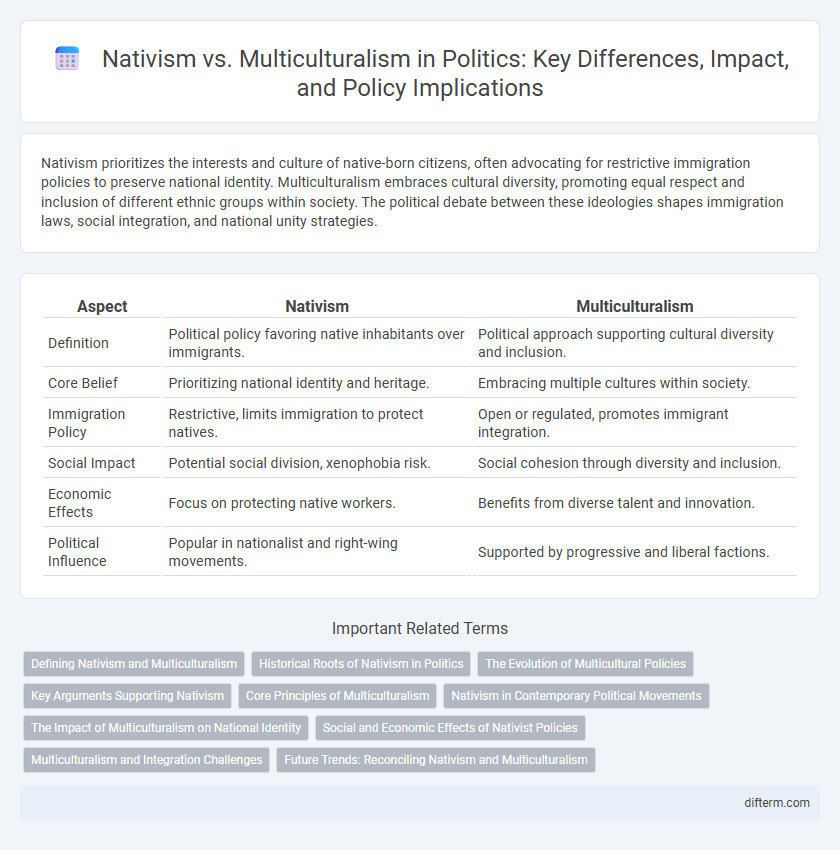Nativism prioritizes the interests and culture of native-born citizens, often advocating for restrictive immigration policies to preserve national identity. Multiculturalism embraces cultural diversity, promoting equal respect and inclusion of different ethnic groups within society. The political debate between these ideologies shapes immigration laws, social integration, and national unity strategies.
Table of Comparison
| Aspect | Nativism | Multiculturalism |
|---|---|---|
| Definition | Political policy favoring native inhabitants over immigrants. | Political approach supporting cultural diversity and inclusion. |
| Core Belief | Prioritizing national identity and heritage. | Embracing multiple cultures within society. |
| Immigration Policy | Restrictive, limits immigration to protect natives. | Open or regulated, promotes immigrant integration. |
| Social Impact | Potential social division, xenophobia risk. | Social cohesion through diversity and inclusion. |
| Economic Effects | Focus on protecting native workers. | Benefits from diverse talent and innovation. |
| Political Influence | Popular in nationalist and right-wing movements. | Supported by progressive and liberal factions. |
Defining Nativism and Multiculturalism
Nativism advocates for policies that prioritize the interests of native-born inhabitants over immigrants, often emphasizing cultural homogeneity and strict immigration controls. Multiculturalism promotes the coexistence of diverse cultural, ethnic, and religious groups within a society, encouraging inclusivity and equal recognition of different identities. These contrasting ideologies shape national debates on immigration, social integration, and cultural preservation.
Historical Roots of Nativism in Politics
Nativism in politics historically emerged as a reaction to waves of immigration, often rooted in fear of cultural dilution and economic competition. Key examples include the 19th-century Know-Nothing Party in the United States and the anti-immigrant sentiments during periods of mass European migration. These movements emphasized protecting established cultural norms and national identity against perceived foreign threats.
The Evolution of Multicultural Policies
Multicultural policies have evolved from early assimilationist frameworks to embracing cultural diversity as a societal asset, reflecting global demographic shifts and increasing migration flows. Governments now implement inclusive legislation promoting linguistic rights, anti-discrimination measures, and cultural recognition, highlighting a transition toward pluralistic citizenship. This shift challenges nativist ideologies that prioritize ethnic homogeneity, fostering debates on national identity, social cohesion, and integration strategies.
Key Arguments Supporting Nativism
Nativism asserts that prioritizing the cultural and economic interests of native-born citizens helps preserve national identity and social cohesion. Proponents argue that restricting immigration reduces competition for jobs and public resources, thereby safeguarding employment opportunities and welfare benefits for the native population. It also emphasizes the importance of protecting traditional values and social norms from the perceived disruptions caused by multicultural policies.
Core Principles of Multiculturalism
Multiculturalism upholds the core principles of cultural diversity, inclusivity, and equal respect for all ethnic and cultural groups within a society. It promotes policies that protect minority rights, encourage intercultural dialogue, and foster social cohesion through mutual understanding. These principles counteract nativist ideologies by emphasizing pluralism and the value of diverse cultural contributions in democratic governance.
Nativism in Contemporary Political Movements
Nativism in contemporary political movements emphasizes preserving national identity by restricting immigration and prioritizing the interests of native-born citizens, often framing multiculturalism as a threat to social cohesion. Political parties advocating nativism promote policies aimed at tightening immigration controls, limiting cultural diversity, and reinforcing borders to protect perceived economic and cultural stability. These movements frequently leverage economic anxieties and national security concerns to justify exclusionary practices and challenge globalist perspectives.
The Impact of Multiculturalism on National Identity
Multiculturalism reshapes national identity by promoting inclusivity and cultural diversity, challenging traditional nativist narratives that emphasize ethnic homogeneity. It fosters social cohesion through policies that recognize minority rights, yet sparks debates about integration and loyalty within the political sphere. The resulting national identity often becomes a dynamic, pluralistic construct that balances shared values with diverse cultural expressions.
Social and Economic Effects of Nativist Policies
Nativist policies often result in reduced labor market flexibility, limiting access to diverse talent pools and suppressing economic growth potential. Socially, these policies can increase community polarization and hinder social cohesion by marginalizing immigrant populations. Economic consequences include decreased innovation and slower adaptation to global market demands due to restricted cultural exchange and reduced workforce diversity.
Multiculturalism and Integration Challenges
Multiculturalism promotes the coexistence of diverse cultural identities within a unified society, fostering inclusivity and mutual respect. Integration challenges often arise from linguistic barriers, socio-economic disparities, and differing cultural norms, which can hinder social cohesion and equal participation. Effective policies addressing education, employment, and anti-discrimination are essential to overcome these challenges and support harmonious multicultural integration.
Future Trends: Reconciling Nativism and Multiculturalism
Future political trends indicate a complex interplay between nativism and multiculturalism, with policymakers seeking hybrid models that balance national identity preservation and cultural diversity. Emerging governance frameworks emphasize inclusive nationalism, promoting social cohesion while respecting minority rights, supported by data showing increased public demand for both cultural recognition and security. Technological advancements in data analysis and social platforms further enable tailored policy responses that reconcile the competing priorities of nativist and multicultural constituencies.
nativism vs multiculturalism Infographic

 difterm.com
difterm.com